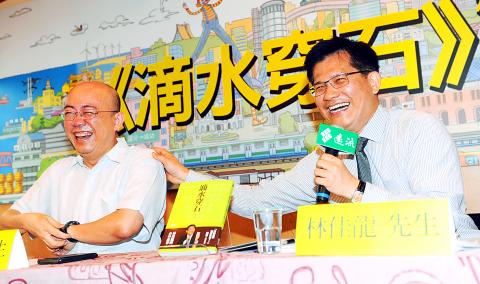Former Democratic Progressive Party (DPP) legislator Julian Kuo (郭正亮) yesterday promoted his proposal to freeze the Taiwanese independence clause in the party’s charter, saying that it is aimed at maintaining the nation’s “status quo,” which would help the party in the next presidential race, but agreeing that its adoption could be pushed back until after the year-end local elections.
Before attending the launch of a book about DPP Legislator Lin Chia-lung (林佳龍), the party’s nominee for the Greater Taichung mayoral poll in November’s local elections, Kuo said the US wants a Taiwan that maintains the “status quo,” which is why it supported the Chinese Nationalist Party (KMT) in the 2012 presidential election.
“The idea of freezing the Taiwan independence clause is to maintain the ‘status quo’ in the hope that the US will be neutral in the 2016 presidential election,” Kuo said.

Photo: Chang Chia-ming, Taipei Times
Kuo said he was under no illusion that the Chinese Communist Party would support the DPP if it froze the clause, but does believe it would allow Washington to be neutral in the next presidential poll.
The independence clause of the DPP charter adopted in 1991 calls for the creation of the “Republic of Taiwan” and a new constitution.
Kuo’s proposal, cosponsored by many other DPP delegates, was briefly discussed at the national party congress on Sunday, until DPP Chairperson Tsai Ing-wen (蔡英文) decided to refer it to the Central Executive Committee for discussion and, if necessary, deal with it at a future congress.
Kuo said that the nationwide nine-in-one elections to be held on Nov. 29 are the party’s top priority right now and discussion of the proposal could wait until after the elections or the Lunar New Year holiday early next year.
By waiting, the DPP could ride the crest of success in the local elections and the momentum of choosing the party’s presidential candidate in May next year to help the measure pass at the next national congress in July of that year, Kuo said.
In other news, a Chinese academic has argued that that the DPP remains the biggest hurdle for the peaceful development of cross-strait relations, a digital Chinese media outlet reported.
Zhou Zhihuai (周志懷), director of the Chinese Academy of Social Sciences’ Institute of Taiwan Studies, made the remarks at a cross-strait relations seminar that opened in Qinghai Province yesterday, www.crntt.com reported.
Zhou said that as the two sides of the Taiwan Strait make major progress on peacefully developing relations, four issues have arisen:
After Tsai was re-elected as DPP chair in May, she said that “freezing the Taiwan Independence clause would require a lot of time” and that “China will adjust to the DPP after it triumphs in the year-end local elections,” Zhou was reported as saying. “This shows that the DPP is still the biggest hurdle to the peaceful development of cross-strait ties.”
Another issue was the mass protest in March against the cross-strait services trade agreement — dubbed the Sunflower movement — which Zhou said shows that while Taiwanese are supportive of the peaceful development of bilateral ties, they have misunderstandings and misgivings about the future course of these relations.
Also, the existing political differences between the two sides have become more salient and both parties need to address them squarely, he said.
Finally, Taiwan is to stage two major electoral events soon — the year-end local elections and the 2016 presidential poll — which will create uncertainty for the peaceful development of cross-strait relations, Zhou said.

An essay competition jointly organized by a local writing society and a publisher affiliated with the Chinese Communist Party (CCP) might have contravened the Act Governing Relations Between the People of the Taiwan Area and the Mainland Area (臺灣地區與大陸地區人民關係條例), the Mainland Affairs Council (MAC) said on Thursday. “In this case, the partner organization is clearly an agency under the CCP’s Fujian Provincial Committee,” MAC Deputy Minister and spokesperson Liang Wen-chieh (梁文傑) said at a news briefing in Taipei. “It also involves bringing Taiwanese students to China with all-expenses-paid arrangements to attend award ceremonies and camps,” Liang said. Those two “characteristics” are typically sufficient

A magnitude 5.9 earthquake that struck about 33km off the coast of Hualien City was the "main shock" in a series of quakes in the area, with aftershocks expected over the next three days, the Central Weather Administration (CWA) said yesterday. Prior to the magnitude 5.9 quake shaking most of Taiwan at 6:53pm yesterday, six other earthquakes stronger than a magnitude of 4, starting with a magnitude 5.5 quake at 6:09pm, occurred in the area. CWA Seismological Center Director Wu Chien-fu (吳健富) confirmed that the quakes were all part of the same series and that the magnitude 5.5 temblor was

The brilliant blue waters, thick foliage and bucolic atmosphere on this seemingly idyllic archipelago deep in the Pacific Ocean belie the key role it now plays in a titanic geopolitical struggle. Palau is again on the front line as China, and the US and its allies prepare their forces in an intensifying contest for control over the Asia-Pacific region. The democratic nation of just 17,000 people hosts US-controlled airstrips and soon-to-be-completed radar installations that the US military describes as “critical” to monitoring vast swathes of water and airspace. It is also a key piece of the second island chain, a string of

The Central Weather Administration has issued a heat alert for southeastern Taiwan, warning of temperatures as high as 36°C today, while alerting some coastal areas of strong winds later in the day. Kaohsiung’s Neimen District (內門) and Pingtung County’s Neipu Township (內埔) are under an orange heat alert, which warns of temperatures as high as 36°C for three consecutive days, the CWA said, citing southwest winds. The heat would also extend to Tainan’s Nansi (楠西) and Yujing (玉井) districts, as well as Pingtung’s Gaoshu (高樹), Yanpu (鹽埔) and Majia (瑪家) townships, it said, forecasting highs of up to 36°C in those areas